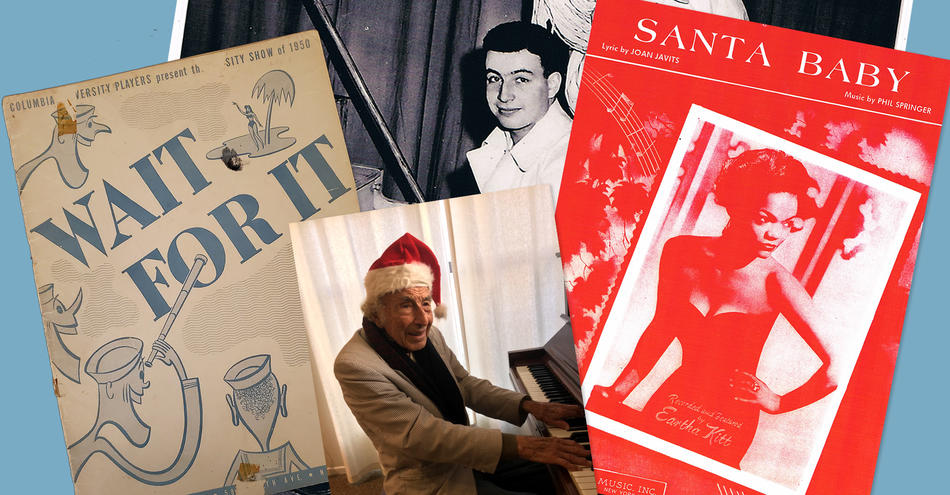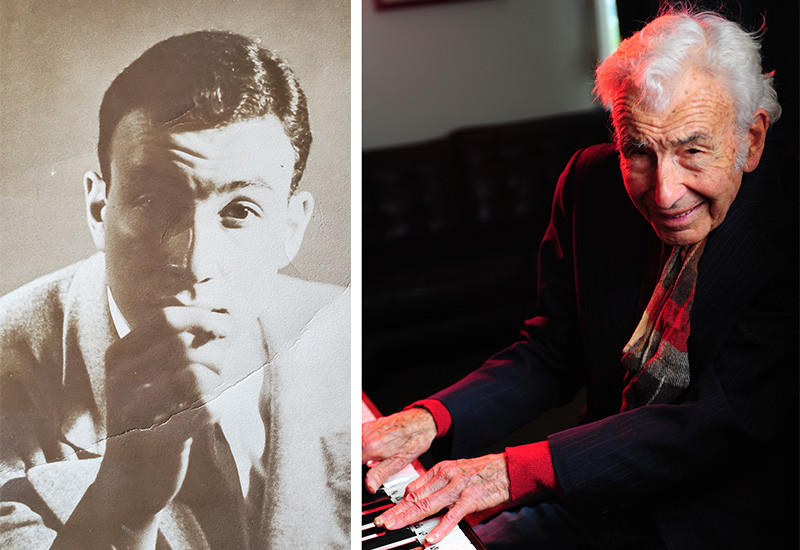What Broad Way Show Is Santa Baby From
In Apr 1953, the month Judy Garland recorded his song "Heartbroken," Phil Springer '50CC, a twenty-vii-year-former composer on the Upper Eastward Side, phoned a lyricist whose work he admired. Her name was Joan Javits, and she was a staff writer in the Brill Building, the xi-story song factory at Broadway and 49th where writers, publishers, producers, and performers churned out material in pursuit of the golden apple tree — a hit tape.
Javits had penned the words to "Second Fling," a plucky ditty sung past country crooner Eddy Arnold and released before that year. It wasn't a hit, simply it had sassy lines similar The ladies used to like my lovin' / And I ain't forgot a thing / I got some oats need sowin', out I'm goin' / Have me a second fling.
Springer had already worked with some of the best lyricists around. He'd written "Heartbroken" with Fred Ebb, who with John Kander '54GSAS would continue to create the musicals Cabaret and Chicago. And his 1950 song "Teasin,'" sung past Connie Haines, had lyrics by Richard Adler, later known for The Pajama Game and Damn Yankees. A sly sendup of coquetry, "Teasin'" had reached no. iv on the charts — a bona fide hit. Now Springer sought to join forces with Javits.
"I called her and said, 'I would similar to write songs with you lot,'" says Springer, in a rich New Yorkese cured with the table salt of former Broadway. "She said, 'I don't have time to write with you lot.' I said, 'Practice you lot know my song 'Teasin''?' She said, 'Of course. It was a hit.' I said, 'Did you e'er write a hit?' She said, 'No.' I said, 'You're gonna tell me that a songwriter who never had a hit is refusing to work with a songwriter who had a hit?' She said, 'What are you doing this night?' I said, 'I'yard writing with you.' And that's how we started."
So in the spring of 1953, with erstwhile Columbia president Dwight D. Eisenhower '47HON in the White House and the radio in every Studebaker on the parkway yipping with "(How Much Is) That Doggie in the Window," Springer and Javits fix out for Hitting City.
A few months subsequently, the bosses at RCA Victor told Javits and Springer that they wanted a Christmas number for Eartha Kitt, a sultry twenty-six-year-one-time entertainer who had sizzled in a sleeveless mini-dress in the Broadway revue New Faces of 1952, and whose recording of the French song "C'est si bon" was riding the charts. Springer was baffled. Christmas songs meant sleigh bells, Yule logs, and a plump, chaste, white-disguised man in a red suit, and Kitt, who would call her memoir Confessions of a Sex Kitten, was not to be confused with Bing Crosby. When Springer raised his concerns, the bosses told him, "Just worry about the music."
So Springer did, but he didn't have to worry too much. "People enquire me what comes kickoff in songwriting, the music or the lyrics," he says, "and the answer is neither: the title comes first." And Javits delivered a beauty: "Santa Baby." It clicked. Springer came upwards with four perfect notes to lucifer the syllables. "Once you lot find a championship, y'all then write a little tune, or the lyric writer writes a line, and you work on the song together." Using a standard chord progression, Springer crafted a catchy melody within Kitt's vocal range. "I took the song directly to RCA Victor and played it for the musical director, Henri René, and he made that great arrangement that yous hear when Eartha Kitt sings," says Springer. "I wish he was notwithstanding alive, considering I'd transport him a big check."
Released on October 6, 1953, "Santa Baby" bandage Kitt as a coy, get-getting sweetheart who addresses a sure "Santa" on intimate terms, proverb she'due south been "an atrocious proficient girl" and would like to collect her Christmas reward: a Cadillac convertible (light blue), a yacht, Tiffany ornaments for her Christmas tree, and — she forgot to mention — "one little thing / a ring / I don't mean on the phone." In a year when Americans flocked to see Marilyn Monroe in How to Marry a Millionaire, "Santa Baby" caught the zeitgeist.
"That song," says Springer, "inverse my life."
Springer grew up in Lawrence, Long Island, i of the V Towns. He took piano lessons and fell in love with the songs on the radio — the top-shelf stuff by Cole Porter, Richard Rodgers 1923CC, 1954HON, the Gershwins, and his favorite, Harold Arlen. At xv he began writing songs. He performed one of them in high school, and the kids went so crazy for it that i of them, Marty Mills, offered to introduce Springer to his father, a Brill Edifice executive who had published "Stardust" in 1929. "And that'due south how I met Jack Mills, the greatest independent music publisher in America," Springer says. "He didn't have my song, but he encouraged me. He said, 'When you leave of the army, come dorsum and see me. I think yous've got talent.'"
Springer was drafted in October 1944 and sent to England and Frg as a jeep driver, and when the officers found out that he could play all the popular songs on piano, they took him off guard duty. "They said, 'Springer, nosotros'll do the guarding. Y'all just play the piano.'" One soldier took item find of Springer'southward facility — it was Mickey Rooney, ane of the biggest stars in the world. "When he heard me, he said, 'Springer, how would you like to be my musical director?' And so I became very friendly with Mickey, and he got me out of my outfit to be his musical director for his army show. He was just a soldier, just naturally everyone treated him like a star." Springer, as well, had special status. "In the army I was protected by officers who just wanted me to practise music. Not many guys could play every hitting song from America."
The war ended, and Springer started higher at Hofstra before transferring to Columbia, the alma mater of his father, Mordecai Springer 1911CC, 1913LAW. His roommate i n John Jay Hall was Arthur Ochs Sulzberger Sr. '51CC, '92HON, futurity publisher of the New York Times, and he studied composition with the conductor and electronic-music pioneer Otto Luening '81HON. "Luening resented my going down to Broadway and successfully becoming a songwriter," Springer says, "so he gave me the only C that I e'er got."
Among Springer's friends was piano wunderkind Dick Hyman '48CC, composer of the 1947 Varsity Prove, and the two would play dual pianos. Springer cowrote the music for the 1948 Varsity Show, Streets of New York, and was the lead composer of the 1950 show, Expect for It, which he considers his offset existent professional feel. "It was such a great bandage and such a wonderful manager," he says. "Broadway-level." Springer's songs were so achieved that BMI published them — but the 2nd Varsity Show score to be published. The other was 1918'southward Ten for Five, with music by Richard Rodgers. "Going to Columbia," Springer says, "was the virtually beautiful thing that e'er happened to me."
Springer graduated in 1950, and with his new song "Teasin'" on the charts, he went looking for his side by side hit record. He never imagined that information technology would be a Christmas vocal, much less a holiday archetype. "Santa Baby" was hardly his magnum opus, but a hit was a striking, and one of the Brill Edifice'due south biggest publishers, Joy Music, immune Springer to fulfill the dream of any young songwriter by hiring him on staff.
Then, in March 1956, a meteor struck. Just as Capitol Records released Frank Sinatra's Songs for Swingin' Lovers!, RCA Victor came out with an album by a ducktailed twenty-one-year-onetime vocalizer titled Elvis Presley. Ol' Blue Eyes gave way to "Blue Suede Shoes." Rock-and-curlicue, doo-wop and R&B became hot, and the Brill Building saw a new generation of writers: Carole King, Neil Sedaka, Neil Diamond, Laura Nyro, Phil Spector. "The rock revolution put almost all the erstwhile-time songwriters out of concern," says Springer. "The Brill Building was taken over past nineteen-yr-old kids, rock-and-roll writers and publishers. It was a sad fourth dimension for nigh songwriters."
But not for Springer. Though he was already 30 in 1956, his musical preparation at Columbia, and later at NYU, allowed him to flourish. "I was then well educated musically that I was able to adapt," he says. "That was very rare."
In fact, Springer explicitly straddled the divide. In 1956 he wrote a Pinnacle 40 song for Sinatra called "(How Little It Matters) How Little We Know," with lyrics by Carolyn Leigh ("Witchcraft," "The Best Is Nevertheless to Come," "Young at Heart"), and in 1963, Elvis recorded Springer'south "Never Ending." In between, Springer wrote "The Side by side Fourth dimension" for Cliff Richard ("the Elvis of England," Springer notes), which was featured in the 1963 movie Summer Vacation. In another mode, he composed gems for Dee Dee Warwick ("We've Got Everything Going For Usa"), Dusty Springfield ("All Cried Out"), and Aretha Franklin ("Her Little Heart Went to Loveland").
"The 1960s were very productive for me," Springer says. The decade was less kind, withal, to the Brill Building: the British Invasion, led by the Beatles, the Rolling Stones, and other bands that wrote their ain songs, spelled doom for the factory system. "When all the songwriters were out of business except for a few of usa," says Springer, "my musicianship allowed me to get a composer for TV shows and movies."
Springer's crowning collaboration came in the 1970s, when he teamed up with the man he considers to be the greatest lyricist of the twentieth century: E.Y. "Yip" Harburg ("Over the Rainbow," "It's Only a Paper Moon"), best known for The Sorcerer of Oz. Springer and Harburg worked together for 9 years until Harburg'due south decease in 1981.
Nevertheless of all the songs of Springer'due south seventy-plus-twelvemonth career, none has had the legs of "Santa Baby." Long a flirty Christmas-party staple — Mae West covered information technology in 1966 — the song got fresh life when Madonna, going full material girl, recorded a Betty-Boop-inflected rendition in 1987. This heralded a pour of Santa Babies by the likes of Macy Gray, LeAnn Rimes, Kylie Minogue, Taylor Swift, Ariana Grande, Michael Bublé, and Gwen Stefani.
For Eartha Kitt, the trailblazing diva from the cotton fiber fields of South Carolina who became, in the words of Orson Welles, "the most heady woman alive," "Santa Infant" was her biggest striking. She died at age 80-1 in 2008, on Christmas Day.
Springer, now ninety-four, lives in Pacific Palisades on the Westside of Los Angeles. He'south still writing. "I simply finished a song chosen 'When New York Becomes New York Again,' which I think has great potential." He even got a sense of taste of Internet stardom in October, when a video of him playing Beethoven'southward Moonlight Sonata went viral, racking up millions of views. "Isn't that crazy? I never thought I'd become known for playing Beethoven."
Or, come to that, for writing a Christmas chestnut that's just a tad more than naughty than nice. Decades subsequently the nativity of "Santa Baby," Springer, who owns the rights to it, is all the same swamped with licensing requests, and the song's numerous versions accept sold millions worldwide. Throw in moving picture and Tv set soundtracks (Driving Miss Daisy, The Sopranos) and the sales of ringtones, and the deed to "Santa Infant" would fit well on the Christmas list the song describes, alongside the yacht and the calorie-free-blueish convertible: for if there's a gift that keeps on giving, information technology's a hit record.
mewton-woodbeforavy.blogspot.com
Source: https://magazine.columbia.edu/article/santa-baby-changed-my-life


0 Response to "What Broad Way Show Is Santa Baby From"
Post a Comment